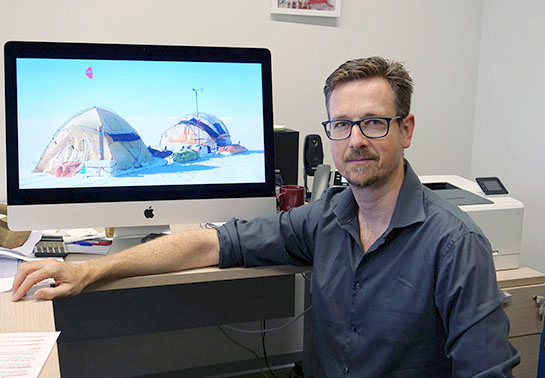Users
Social media
- More details here...
- Address
Parc Científic de la Universitat de València C/
Catedrático Agustín Escardino, 9
46980 Paterna (Valencia) Spain - Email:
iu.i2sysbio@uv.es - Phone:
(+34) 963544810
- Address
Links
The University of Valencia participates in the 'Unexplored Antarctica 2018-2019' expedition

Investigation & Education
Thesis
The University of Valencia participates in the 'Unexplored Antarctica 2018-2019' expedition

The polar eco-vehicle 'Wind Sled', which will carry out the first Spanish Antarctic science and exploration campaign starting next December, will collect data for the Helios project, a research project by the Institute of Integrative Systems Biology (I2SysBio), in the Science Park of the University of Valencia, which aims to identify microorganisms useful in biotechnology.
The Wind Sled Viento is a wind-powered vehicle, sustainable for the environment, economically efficient and effective for research in adverse conditions, which will carry four polar explorers with full autonomy through one of the most unknown and inhospitable areas of Antarctica. The objective of the march is to collect data for ten scientific projects from national and international institutions related to diverse topics, from the constellation of Galileo satellites of the European Space Agency (ESA) or the testing of devices that will travel to Mars, to the search for life in ice, pollution or climate change. I2SysBio synthetic intended to characterize, through sequencing techniques, the communities that inhabit extreme ecosystems, and identify microorganisms that could be used in biotechnology. In this last sense, the team has been carrying out bioprospecting work in extreme natural or artificial environments, such as deserts or photovoltaic solar panels, searching for bacteria, genes and enzymes with possible industrial applications due to their ability to resist the difficult climatic conditions to which they are subjected. “Unexplored Antarctica offers us the opportunity to study the Extremophilous microbial communities present in remote areas of Antarctica,” comments Manuel Porcar, researcher responsible for Helios at this joint center of the University of Valencia and the CSIC. “The key is in the presence of solar panels on the sled, which will act as an Extremophile Trapper throughout its journey and will allow us to learn about the Extremophile microorganisms that live in a completely unexplored region of the planet,” he adds.
Unexplored Antarctica 2018-2019 will also collect data for nine other projects from different organizations: European Space Agency, University of Maine (USA), Autonomous University of Madrid, University of Alcalá de Henares (UAH), UAH/INTA-CSIC, IDAEA/CISC and Astrobiology Center (INTA_CSIC), in addition to work by researcher Alfonso Dávila, who is doing a post-doctoral stay at NASA.
The expedition
The The expedition, led by the polar explorer Ramón Larramendi – creator and promoter of the Wind Sled – will travel 2,000 km along a triangular route never done before without motorized means or external assistance. It will depart on December 4 from the vicinity of the Russian Antarctic base Novolazarevskaya towards the interior of the continent and towards the Fuji dome, the second highest point in the interior of Antarctica, located at 3,810 meters above sea level, where a Japanese base is located and where temperatures of up to 93.2º below 0 have been recorded. Although the expedition takes place during the southern summer, the team will have to endure temperatures below 50º below 0. They will reach the top of the dome from the North American scientific base Base Plateau to begin the return to Novo from Fuji during the second week of February 2019.
Larramendi will travel accompanied by three other expert Sled pilots, trained to carry out the scientific tasks entrusted in this expedition: Ignacio Officialdegui, biologist and specialist in renewable energies; Hilo Moreno, guide and assistant at the Spanish Antarctic base Juan Carlos I, and Manuel Olivera, industrial engineer.
Sponsored by the Prince Albert II of Monaco Foundation and the Tierras Polares travel agency, the expedition is financed by a crowdfunding campaign in which 340 people have participated individually or on behalf of companies and institutions.
The initiative has been highlighted by Nature magazine as an important option for the performance of polar 'clean science.' width="450">
Manuel Porcar, researcher responsible for the Helios project
Link list:


